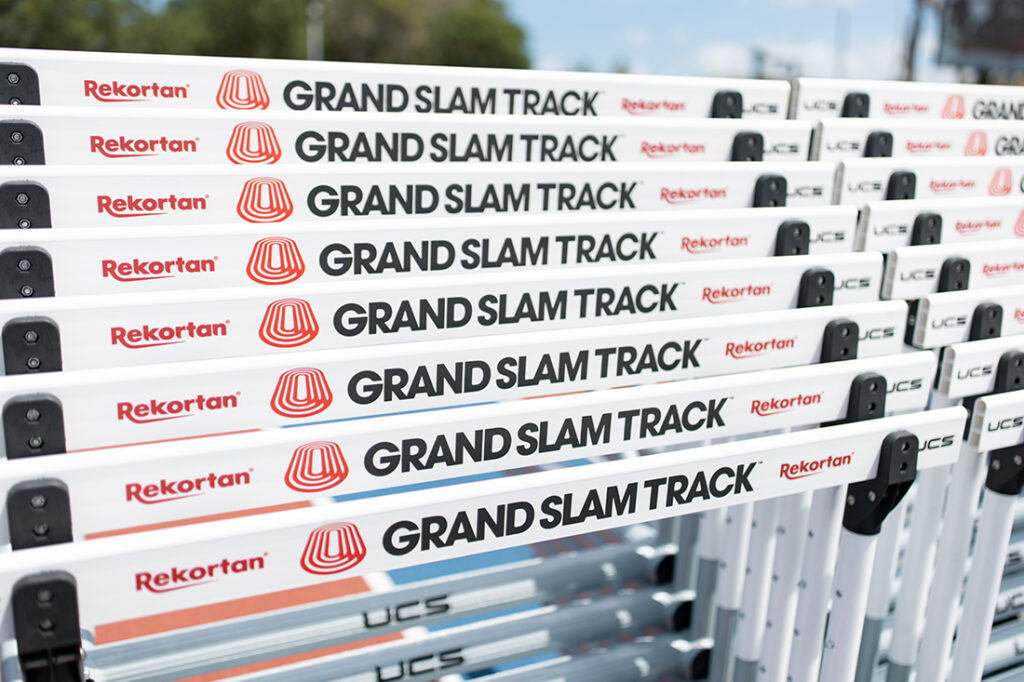Grand Slam Track has told multiple vendors that it hopes they can accept just half of what they are owed so they the league can avoid going bankrupt, according to published reports.
In reports by The Athletic and The Times on Wednesday, several vendors that are owed millions of dollars collectively, were sent letters by the league asking that they all agree to the 50 percent payout in order to receive any funds.
The letters explain the league’s financial hardship, which was later revealed to be an issue since it’s inaugural event in April in Kingston, Jamaica and led to the cancelation of its final meet in Los Angeles in June.
Reports of athletes not being paid appearance fees and prize money surfaced and league founder Michael Johnson later admitted that there was an issue with an investor.
According to the report in The Athletic, some vendors are willing to accept the terms of being paid half while others consider lawsuits since their business would be impacted by not being paid fully.
Grand Slam Track did not respond to attempts to get a comment on the recent report, but the league noted in its communication with the vendors that there is interest in the company being acquired and essentially wiping out all of its debts — with the goal of a second season of competition.
The league continues to navigate a once-promising year while the prospect of a second second looks murky at best.
The league drew headlines in 2024 when Sydney McLaughlin-Levrone was announced as the first signing to its roster. She would later be joined by other big names in the sport like Gabby Thomas, Josh Kerr, Yared Nuguse, Kenny Bednarek, Grant Fisher and Melissa Jefferson-Wooden as contracted “Racers” who would appear at all four scheduled events. They would make up part of the 48 core group of athletes while 48 “Challenger” slot would be filled as needed.
Johnson promised cash prizes that easily outpaced Diamond League payouts as Grand Slam Track event category winners would receive $100,000 and while the eighth-place finishers got $10,000 as part of nearly $13 million in compensation that was announced as set aside strictly for competing athletes.
The league boasted a claim of $30 million in financial backing “from investors and strategic partners” and with Winners Alliance leading the way with an initial $13 million for the venture but had an option to invest an additional $19 million — which apparently did not materialize.
Meanwhile, the Kingston meet in April drew immediate scrutiny from low turnout at the 35,000-seat Jamaica National Stadium on the first of three days of competition. The Miami-area event in May drew packed crowds but weeks before the Philadelphia meet at Franklin Field later in that month it was announced the schedule would be condensed to two days.
When information about non-contracted athletes slated to participate in the Los Angeles event was not released after the Philadelphia showcase, rumors swirled about the stability of the league. The Los Angeles meet was canceled as Johnson claimed that the future of Grand Slam Track necessitated the move, which was seen as abrupt.
Athletes who had already competed in the previous meets, and their representation, were reportedly briefed in July on when prize money would be paid while some athletes even consulted World Athletics on how to proceed. Nearly $13 million in appearance fees and cash prizes had not been paid dating back to the initial meet in Kingston.
But in late July, Johnson said in an interview with Front Office Sports that investor issues compromised the league’s finances.
“We’ve had a very difficult situation this year financially,” Johnson said in the interview. “We had an investor that wasn’t able to honor their complete commitment to the league. So we started off with the capital we needed to get through the season as we planned it with the four slams — and made sure we could take care of everyone.”
In a open letter released in August, Johnson vowed to compensate athletes and vendors in addition to looking ahead to a 2026 Grand Slam Track season.
“Understandably, this has led to frustration, disappointment, and inconvenience to our athletes, agents, and vendors,” the letter read. “I know this damages trust. I know this makes some wonder if our vision can survive. That is why we are not just addressing the immediate problem; we are putting systems and partnerships in place to make sure it never happens again.”
On October 3, there appeared to positive traction as the league sent an email to athletes and vendors that an infusion of financing would start keep the company afloat as internal restructuring and staff layoffs were put in motion.
“Today is the beginning of Grand Slam Track’s reboot. We apologize for frustrations and hardships caused by the payment delays to date.” the email read. “Over the next 60 days, we will be working hard to make things right with everyone who helped make 2025 a success, to best position GST for 2026 and beyond. This is a critical step in that delicate and difficult process, but know there is a path. Our appreciation of your grace and support as we walk that path cannot be overstated.”





